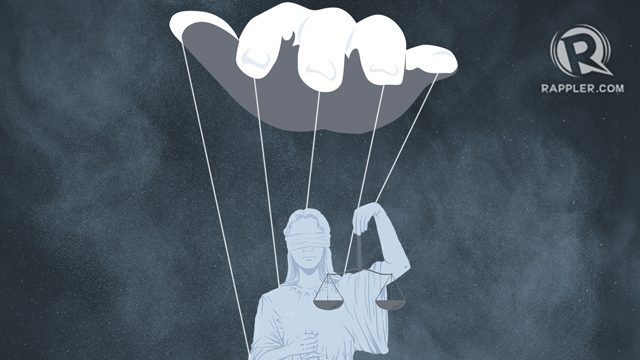SUMMARY
This is AI generated summarization, which may have errors. For context, always refer to the full article.
![[OPINION] Newspoint | Abnormal evolution of justice](https://www.rappler.com/tachyon/r3-assets/612F469A6EA84F6BAE882D2B94A4B421/img/D50E797189D44466921883A2E35102A0/vergel-santos-headshot-150px.jpg)
The case against Senator Leila de Lima is an abnormal one – abnormal in the way it was put together, abnormal in the way it’s been proceeding: It was initiated by President Rodrigo Duterte, it was cooked in his Congress, and it’s now being prosecuted by his solicitor general in an ordinary court, not by the tenured, thus presumed more independent, Ombudsman in the court precisely designated to try state officials – the Sandiganbayan.
Thus, the case assumes political color, and makes De Lima a political detainee, although, again, not in the normal sense of one fighting for an opposite ideology but, rather, in the simple and expedient sense of one from a rival political camp. Duterte himself shows no ideological conviction. He seems more like a floating ideologue, if there’s such an insect: he flies around a whole garden of ideologies clueless.
Ideology is a system of political and economic thought that chooses a particular character in a particular environment in whom to incubate, and conviction is well-informed steadfastness. Simpleminded, impulsive, and stubborn, Rodrigo Duterte is just all wrong for both.
Before becoming president, Duterte had been a provincial-city mayor for more than two decades. If that length of time afforded him sufficient experience in leadership, it was in leadership by authoritarianism, which is no ideology; it is, in fact, a crime – a crime against a whole democratic constituency. Indeed, he has carried over his authoritarian habits into the presidency, and now threatens a whole nation.
There’s little doubt he strong-armed De Lima into jail. She went in, without the benefit of bail, on a charge of conspiracy to sell illegal drugs on the 8th month of his presidency. The supposedly solid evidence presented against her consisted mostly of testimonies of life-term convicts herded by Duterte’s justice secretary, himself the penitentiary’s chief bastonero; there was no money, no drugs, nothing concrete, let alone solid.
State lawyers quibble that the charge is not selling illegal drugs per se, but conspiracy to sell them, as if, in that case, the standards of judicial appreciation change as to what constitutes prima facie evidence. Certain antecedents should contribute to a more complete and credible picture than the state presents.
When De Lima was chairperson of the Commission on Human Rights and Duterte was mayor, she began to investigate him for death-squad murders in his city, and he threatened to get back at her. They both won in the national elections of May 2016 and assumed office the following July, she as senator, he as president, and the conflict went on.

At a hearing of De Lima’s Senate committee on justice and human rights in September last year, a confessed assassin for Duterte, Edgar Matobato, admitted taking part in some 50 summary executions and testified that Duterte himself had 8 kills by his own hand (Duterte would later own to 3). Matobato also told of a plot on De Lima’s life when she came to Davao City for her commission’s inquiry; a change of route frustrated it.
Matobato’s testimony cost De Lima the chairmanship of the committee in a vote forced by the majority. It also provoked, in both houses of Duterte’s sycophantic Congress, public hearings featuring a choir of convicts chanting against De Lima. She was hauled to jail 5 months later.
In the meantime, despite all efforts at damage control for Duterte, another confessed hitman for Duterte, Arturo Lascañas, managed to get his own story out, first in a press conference, then in a single appearance conceded by the Senate. Lascañas, a newly retired police officer, corroborated Matobato’s testimony, then followed him into hiding.
Desperate hopes for De Lima were pinned on the Supreme Court. This week it dashed them, rejecting, 9 votes to 6, De Lima’s petition for the case to be quashed and for her to be set free. The ruling was no surprise, really. Again, antecedents are instructive.
Previous significant Supreme Court decisions in Duterte’s presidency also pleased him: exempting Juan Ponce Enrile from the rule denying bail to anyone accused of plunder; acquitting former president Gloria Macapagal-Arroyo, also of plunder; and approving a hero’s burial for Duterte’s professed idol, the dictator Ferdinand Marcos. Enrile, Arroyo, and Marcos’ heirs are all Duterte allies now.
Each case betrayed a voting pattern that lumped together Arroyo-appointed justices who constituted the majority. In De Lima’s case, the 9 consisted of holdovers from that majority and new Duterte appointees.
Such is the abnormal evolution of justice in the Duterte presidency. (READ: De Lima ruling ‘one of the grossest injustices’ – Carpio) – Rappler.com
Add a comment
How does this make you feel?
There are no comments yet. Add your comment to start the conversation.